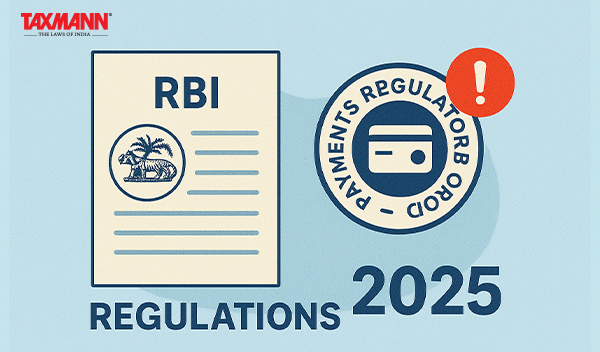RBI Notifies ‘Payments Regulatory Board’ Regulations, 2025
- Blog|News|FEMA & Banking|
- 2 Min Read
- By Taxmann
- |
- Last Updated on 23 May, 2025

Notification No. CO.DPSS.BD.No.S168 /02-01-012/2025-2026; Dated: 20.05.2025
1. Regulation at a Glance
The Payments Regulatory Board Regulations, 2025 (PRB Regulations) have been notified by the Reserve Bank of India (RBI) to operationalise the amended section 3 of the Payment and Settlement Systems Act, 2007. The regulations replace the existing Board for Regulation and Supervision of Payment and Settlement Systems (BPSS) and lay down an end-to-end governance code for the new Payments Regulatory Board (PRB)—covering its make-up, conduct, working procedures, committees and the financial terms of its members.
2. Eligibility, Tenure & Vacation of Office
- Age ceiling – 70 years at the date of nomination.
- Disqualifications – an MP/MLA; unresolved material conflict of interest with any payment system; conviction for an offence involving moral turpitude; or adjudged insolvency.
- Term – Up to five years per appointment; eligible for one re-appointment, subject to the age limit.
- Vacation/removal – A seat falls vacant on resignation, expiry of term, or removal by the Central Govt. on grounds of misconduct, incapacity, or persistent default. A casual vacancy is filled for the remainder of the term.
3. Code of Conduct
Every Member (and Invitee, to the extent applicable) must:
- Act only in the PRB’s interest and avoid any situation of conflict.
- Maintain confidentiality of non-public information obtained in the course of duty.
- Disclose holdings/relationships in any entity regulated or supervised by the PRB and recuse from related deliberations.
- Refrain from assuring benefits to any person in exchange for influence or information.
- Comply with RBI’s internal policies on gifts, hospitality, securities dealing and use of official resources.
A breach of the Code, if established by the Board, is treated as “misconduct” and can trigger removal.
4. Meetings, Quorum & Voting
- Frequency – At least two meetings each financial year; additional meetings may be convened by the Chair.
- Notice – Minimum seven calendar days; shorter notice allowed for urgency with consent of a majority.
- Quorum – Four members (inclusive of the Chair/deputy). Presence may be physical or via secure video-conference.
- Decision-making – One vote per member; simple-majority rule. Chair (or, in absence, the Deputy-Governor) has a casting vote when votes are equal.
5. What Market Participants Should Do
- Track PRB notifications—all payment-system circulars will henceforth be issued under PRB’s seal.
- Expect revised consultative timelines—the Regulation Committee is mandated to publish drafts for public comment unless an exemption is recorded.
- Prepare for unified supervision—existing licences/approvals under the PSS Act continue, but inspection notices will carry the PRB docket number.
Bottom line – The Payments Regulatory Board Regulations, 2025 transplant India’s payment-system rule-making and supervisory powers from an RBI committee to a six-member statutory board, backed by a clear governance playbook – age-capped, term-limited members; a mandatory code of conduct; minimum meeting frequency and quorum; specialist committees; and a transparent, government-notified remuneration framework. Stakeholders should monitor the PRB’s first few meetings (expected by Q2 FY 2025-26) for early policy signals on digital payments, fintech licensing and systemic-risk oversight.
Click Here To Read The Full Notification
Disclaimer: The content/information published on the website is only for general information of the user and shall not be construed as legal advice. While the Taxmann has exercised reasonable efforts to ensure the veracity of information/content published, Taxmann shall be under no liability in any manner whatsoever for incorrect information, if any.

Taxmann Publications has a dedicated in-house Research & Editorial Team. This team consists of a team of Chartered Accountants, Company Secretaries, and Lawyers. This team works under the guidance and supervision of editor-in-chief Mr Rakesh Bhargava.
The Research and Editorial Team is responsible for developing reliable and accurate content for the readers. The team follows the six-sigma approach to achieve the benchmark of zero error in its publications and research platforms. The team ensures that the following publication guidelines are thoroughly followed while developing the content:
- The statutory material is obtained only from the authorized and reliable sources
- All the latest developments in the judicial and legislative fields are covered
- Prepare the analytical write-ups on current, controversial, and important issues to help the readers to understand the concept and its implications
- Every content published by Taxmann is complete, accurate and lucid
- All evidence-based statements are supported with proper reference to Section, Circular No., Notification No. or citations
- The golden rules of grammar, style and consistency are thoroughly followed
- Font and size that’s easy to read and remain consistent across all imprint and digital publications are applied



 CA | CS | CMA
CA | CS | CMA
